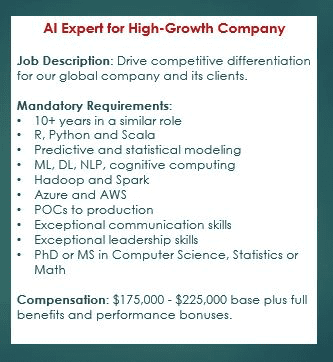Artificial intelligence jobs are not a new phenomenon, but the AI job market is growing as AI market itself is seeing rapid expansion. According to research firm IDC, AI is currently seeing an annual growth rate approach 40 percent.
Amid these changes, AI job titles have changed and expanded – and AI paychecks are heading skyward. Earlier roles were “statistician” or “mathematician,” while today you’ll hear newer terms like “data scientist” and “predictive analytics expert.”
The rapid emergence of new AI titles reflects the fact that AI has become practical for mainstream use as the result of affordable cloud computing and storage costs, a change from prohibitively expensive supercomputers. The growth of AI companies and the expansion of related technology like machine learning has expanded AI job titles.
Similarly, some of the AI algorithms used today have existed for several decades, but until recently, they lacked the volume and richness of data required to drive value. Now there are many different types of AI jobs or roles available, some of which merely add “AI” to an existing title (e.g., “AI developer”). Others reflect different aspects of AI (e.g., “data engineer,” “algorithm developer” or “machine learning scientist”).
For the purpose of this article, AI job titles, their general job descriptions and their salary ranges are limited to technical titles.
Also see: The Pros and Cons of AI

A typical ad for an AI job in today’s rapid growth artificial intelligence sector.
AI Job Titles
Jobseekers and career builders are wise not to take AI job titles at face value. For example, some companies require data scientist candidates to hold a PhD or MS in Computer Science or Statistics, while other organizations may accept a BS or even no college degree and certain types of experience. Similarly, a “senior” title may require a graduate degree and more experience at some companies than others.
Some of today’s most popular AI job titles include:
- AWS machine learning engineer
- Machine learning scientist
AI Job Descriptions
It is important to read the mandatory requirements of any job listing to determine whether it is actually a fit. For example, some technical AI positions require R and Python expertise whereas others may only require R or Python experience.
Sometimes job descriptions, including candidate requirements, can differ by industry. For example, in scientific industries such as pharmaceutical companies, PhDs are common, so they may require more advanced degrees for some positions than organizations operating in other industries such as advertising.
Another reason to maintain an open mind about job descriptions is that the people writing and approving job requisitions may lack the technical expertise to articulate what the organization actually needs. The result is sometimes unrealistic qualifications that even the most sought-after experts lack.
Following are some sample job descriptions that are based on actual job postings. They have been abbreviated for easier comparison.
AI Developer
Job description: Responsible for maintaining, enhancing and implementing AI solutions.
Mandatory skills:
- AWS or Azure AI services and frameworks
- AI, ML, NLP, REST APIs, libraries, frameworks
- Cloud application design, development and deployment
- Hands-on experience with AI, ML, NLP and cloud applications
Education: BS, Computer Science
AI Engineer
Job description: Develops solutions to large-scale problems and bridges the gap between software developers and research scientists
Mandatory skills:
- ML, DL, NLP, computer vision
- Past experience defining and coding and validation tests
- Test automation script writing
Education: MS or PhD in Computer Science, AI, ML or related field.
Algorithm Developer
Job description: Develops algorithms for specific use cases.
Mandatory skills:
- Algorithm performance assessment and reporting
Education: BS in Computer Science or equivalent as relevant to the position (e.g., Robotics or Electrical Engineering)
AWS or Azure machine learning engineer
Job description: Build out data models and create very large data sets.
Mandatory skills:
- 3+ years of AWS or Azure services experience
- 3+ years ML and data labeling
- 3+ years Python or R and Python
- 3 – 5 years data management experience
Education: BS, Compute Science, MS or PhD may be preferred
AWS or Azure data scientist
Job description: Translate customer requirements into POCs and successful solutions.
Mandatory skills:
- 2+ years of data science experience
- ML, NLP, DL, depending on the position and clients
- Experience with platform (AWS or Azure) and its services
Education: MS in Computer Science or related field
Data scientist
Job description: Organize structured and unstructured data, build data models and interpret complex data sets
Mandatory skills:
- ML and/or NLP, DL depending on the position
Education: BS or MS in Computer Science or Equivalent
Lead data engineer
Job description: Re-engineer business intelligence processes, design and develop data models, and share your expertise throughout the deployment process.
Mandatory skills:
Education: BS, Computer Science or equivalent
Lead data scientist
Job description: Turn client challenges and goals into successful AI, ML or DL solutions that meet or exceed expectations; train junior data scientists.
Mandatory skills:
- R, Python, or both preferred
- POC development and demonstration
- 8+ years end-to-end analysis that includes data gathering and requirements specification, processing, analysis, ongoing deliverables and presentations
- 8+ years of development, implementation and use of ML models and quantitative techniques for prediction and classification
- 2+ years of relevant, specialized experienced (e.g., NLP)
Education: MS in Computer Science, Statistics, or Math; PhD preferred
ML scientist
Job description: Develop next-generation machine learning technologies that advance the state of a particular industry.
Mandatory skills:
- Proven, in-depth understanding of ML algorithms and modeling including supervised, unsupervised and reinforcement learning models, transfer learning, optimization and probabilistic graphical models
- In-depth experience with Spark or Hadoop and either PyTorch or Tensorflow
- Python and Java, Scala, and/or R
- Experience creating production environment data analytics and applications
Education: PhD in Computer Science or related field with a focus on ML, AI or data mining or an MS plus experience equivalent to holding a PhD
AI Jobs: Additional Experience Required
For any number of complex reasons, some AI jobs require additional significant experience, as do the positions below. In truth, the field is still new enough that the exact amount of experience is heavily dependent on individual employers.
NLP data developer/engineer
Job description: Apply different NLP techniques to areas such as classification, data/knowledge extraction, disambiguation, sentiment analysis, etc. Identify and categorize entities in text such as people, places, organizations, date/time, quantities, percentages, currencies and more.
Mandatory skills:
- AWS or Azure AI services and frameworks (cognitive, bots)
- AI, ML, NLP, REST APIs, libraries, frameworks
- Cloud application design, development and deployment
Experience Level:
- 10+ years with the target platform (AWS or Azure)
- 5+ years development experience
- Hands-on POC experience proving an architecture concept
- Experience with large, diverse data sets
Education: MS in Computer Science or Computer Information Systems (CIS)
Senior AI developer
Job description: Responsible for maintaining, enhancing and implementing solutions
Mandatory skills:
- AWS or Azure AI services and frameworks (cognitive, bots)
- AI, ML, NLP, REST APIs, libraries, frameworks
- Cloud application design, development and deployment
Experience Level:
- 10+ years software development
- 5+ years AI, ML, NLP and cloud application development
Education: BS, Computer Science or Engineering
Senior data scientist
Job description: Design and implement cutting-edge solutions across a breadth of domain areas.
Mandatory skills:
- ML, DL, NLP, computer vision, recommendation engines, pattern recognition, large-scale data mining
- Predictive, statistical, and data mining modeling
- Hadoop, Spark or other Big Data platform
- Proficient with ML algorithms
Education: BS or MS in Computer Science, Engineering, Statistics or Math
AI Pay Scale
AI-related jobs tend to share very similar compensation ranges, which may be misleading. While it may seem odd that people with the same title could have base compensation that varies by $50,000 or $100,000, some of the differences have to do with the present levels of compensation in specific markets. For example, jobs in San Francisco and Manhattan tend to pay more than those in other major metropolitan areas given the cost-of-living differences.
Also, a “senior” title may not necessarily be reflected in compensation, which may seem odd. In medium and large companies, those with senior titles tend to be compensated more than people with similar but more junior titles. However, smaller companies with more modest budgets may advertise a senior title in lieu of senior compensation to lure career builders.
Job candidates should therefore go into a job search with an open mind and research what’s available at that point in time. The candidate should also be clear about which titles and compensation packages are acceptable since a better title may not mean more pay or vice versa.
Current salary ranges for the positions discussed above are:
- AI developer: $90,000 – $150,000
- AI engineer – $130,000 – $210,000
- Algorithm developer – $90,000 – $130,000
- Machine learning engineer – $70,000 – $170,000
- Azure or AWS data scientist – $85,000 – $160,000
- Data scientist: $50,000 – $150,000
- Lead data engineer: $90,000 – $175,000
- Lead data scientist: $125,000 – $195,000
- Machine learning scientist: $100,000 – $150,000
- ML data developer: $100,000 – $170,000
- Senior AI developer: $90,000 – $150,000 (high end)
- Senior data engineer: $90,000 – 175,000
- Senior data scientist: $95,000 – $210,000
SEE ALL
ARTIFICIAL INTELLIGENCE ARTICLES








